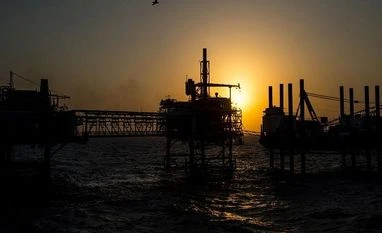Crude oil jumped while the rouble plunged nearly 30% to a record low on Monday after Western nations imposed tough new sanctions on Russia for its invasion of Ukraine, including blocking some banks from the SWIFT global payments system.
Safe-haven demand boosted bonds along with the dollar and yen while the euro sank after Russian President Vladimir Putin put nuclear-armed forces on high alert on Sunday, the fourth day of the biggest assault on a European state since World War Two.
The ramp-up in tensions heightened fears that oil supplies from the world's second-largest producer could be disrupted, sending Brent crude futures up $4.21 or 4.3% to $102.14. U.S. West Texas Intermediate (WTI) crude futures were up $4.58 or 5.0% at $96.17 a barrel.
"I am telling clients all we know for certain is that energy prices are going to be higher, and there are going to be some beneficiaries," said John Milroy, Ord Minnett financial advisor in Sydney.
"It's an old cliche, but it's true that uncertainty drives moves in both directions."
Asia-Pacific shares turned lower after spending the morning session mostly in the green, putting them in line with declines for U.S. and European stock futures.
Also Read
Japan's Nikkei 225 fell 0.25%, while Chinese blue chips slipped 0.36%. Australia's benchmark, though, added 0.64%, boosted by energy shares.
MSCI's index of regional stocks lost 0.58%.
U.S. emini stock futures were pointing to a 2.35% drop at the restart, while pan-European EURO STOXX 50 futures slid 3.90%. FTSE futures declined 1.21%.
"We had a deluge of very negative information over the weekend," said Kyle Rodda, a market analyst at IG Australia. "We're talking about financial stability risks, and sprinkle over that the threat of nuclear war."
"Volatility is heightened," he said. "Price action is incredibly choppy."
The 10-year U.S. Treasury yield fell about 9 basis points to 1.89%, and equivalent Australian yields retreated about 6 basis points to 2.177%.
The euro slid 1.1% to $1.11465 and 1.1% to 128.785 yen, while the risk-sensitive Australian and New Zealand dollars sank 0.78% and 0.88%, respectively.
The rouble dived as much as 29.67% to a record-low 119.5 per dollar.
Gold rose more than 1% to around $1,909 on demand for the safest assets.
"This volatility will go on for a while yet, until the dust settles," said Shane Oliver, chief economist at AMP Capital.
In the meantime, "markets are going to be swinging from headline to headline," he said.
(Reporting by Kevin Buckland; Additional reporting by Scott Murdoch and Alun John; Editing by Stephen Coates)
(Only the headline and picture of this report may have been reworked by the Business Standard staff; the rest of the content is auto-generated from a syndicated feed.)
)